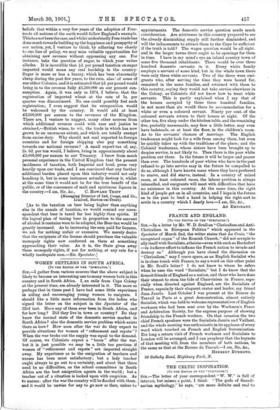WOMEN SETTLERS IN SOUTH AFRICA. [TO THE EDITOR OF THB
"SPECTATOR:]
gather from various sources that the above subject is likely to become an interesting one to many women both in this eountry and in South Africa. I, an exile from Cape Colony at the present time, am already interested in it. The more so perhaps that in times past I have had some little experience in aiding and encouraging young women to emigrate. I should like a little more information from the ladies who signed the letter on the subject in the Spectator of the 23rd inst. Have any of them ever been in South Africa, and for how long ? Did they live in town or country ? Do they know the normal state of the domestic service market in • South Africa ? also the domestic service problem which exists there as here ? How soon after the war do they expect to provide situations for women of "refinement and repute" ? When the war broke out the supply was equal to the demand. Of course, we Colonists expect a " boom " after the war, but it is just possible we may be a little too previous if women of "refinement and repute" are imported straight away. My experience as to the emigration of teachers and nurses has been most satisfactory ; but a lady teacher ought always to go out to a certainty, and about that there need be no difficulties, as the school committees in South Africa are the best emigration agents in the world ; but a teacher out of a situation is looked upon with suspicion. As to nurses after the war the country will be flooded with them, and it would be unwise for any to go now or then, unless to appointments. The domestic service question needs much consideration. Are mistresses in'this country prepared to see the.already diminishing _supply still further diminished, and will the inducements to attract them to the Cape be sufficient if the truth is told ? The wages question would be all right, and in the larger towns there ought to be openings for them in time. I have in my mind's eye an inland country town of some five thousand inhabitants. There would be over three hundred domestic servants in it. Every white family employs a servant of some kind, but in the whole town there were only three white servants. Two of the three were emi- grants who, after serving the time they were bound for, remained in the same families, and returned with them to this country, saying they would not take service elsewhere in the Colony, as Colonists did not know how to treat white servants. This is partly explained when I say that of the houses occupied by these three hundred families, in not more than six would there be accommodation for a white or even a coloured servant. Ninety per cent, of the coloured servants return to their homes at night. Of the other ten, five sleep under the kitchen table, and the remaining five, probably nursemaids, may fare a little better, may even have bedsteads, or at least the floor, in the children's room. As to the servants' chances of marriage. The English tradesman might look for a wife from among them, but even be quickly takes up with the traditions of the place ; and the Colonial tradesman, whose sisters have been brought up to despise service, is not likely to. Then there is the poor white problem out there. In the future it will be larger and poorer than ever. The hundreds of poor whites who have in the past refused to go into service may in the future be compelled to do so, although I have known cases where they have preferred to starve, and did starve, instead. In a country of mixed races, at least coloured races, the labour problem is always intensified, and emigrants will meet with difficulties that have no existence in this country. At the same time, the right kind of jaeople get on in all countries, and I hope in the future as in the past to lend a hand in helping the right sort to settle in a country which I dearly love.—I am, Sir, &c.,
AN EMIGRANT.






































 Previous page
Previous page